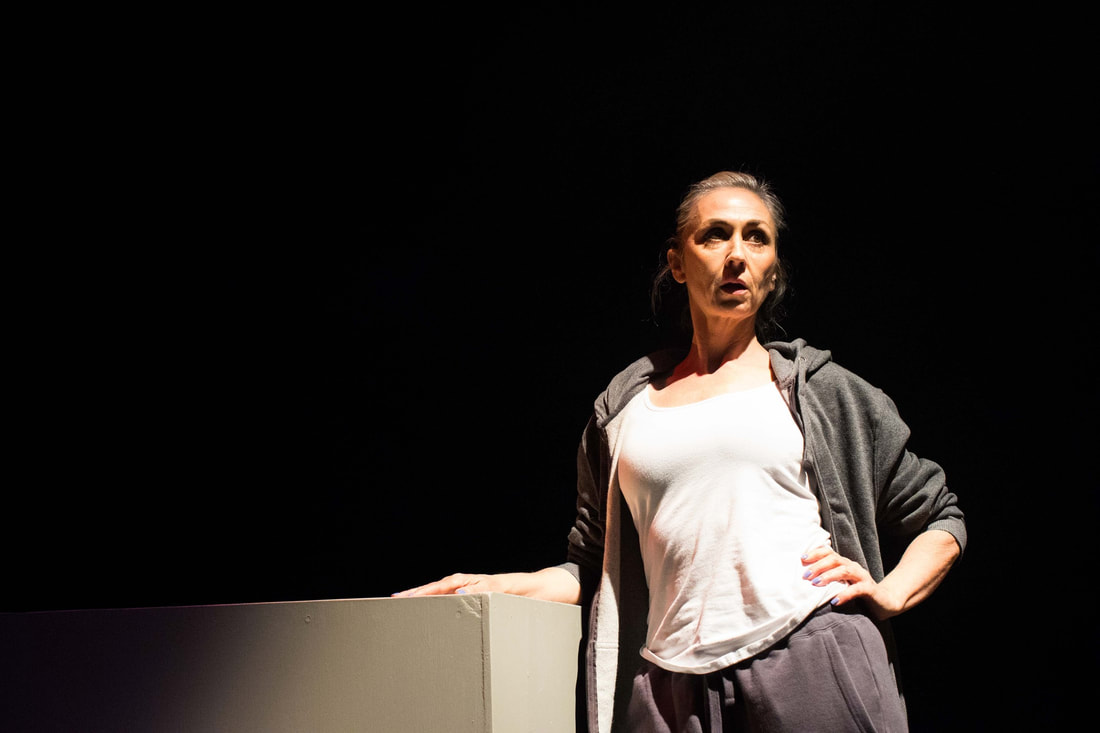Jack McGee
Renee Lyons first performed the show ten years ago in 2013. It’s a massive undertaking, requiring the performer to shift between a variety of characters quickly. More crucially, Lyons has to walk along a knife's edge of characterisation. Verbatim is filled with massive characters, who speak with very specific cadences. The way they speak is inherent to their background, to their education, to the way they live. To ignore this, would be to separate them from core aspects of their humanity. To play it too big, too broad, turns them into caricatures. Of course people are funny, and occasionally these characters are funny too, and so the work has to be done to make sure those laughs feel earned, and not like the show/audience is punching down at these people. That’s the slippery thing about the verbatim nature of the text. The knowledge that these characters are derived from real people, adds stakes. Misjudging any choice risks a show that feels in bad taste. I won’t lie, there is the occasional moment that plays just a little broad for me, and gives me a little bit of ick. But, I think it’s a bit of an impossible task, and thankfully Lyons pretty much gets away with it. She brings real pathos to her performance, injecting the characters of Verbatim with a depth of feeling and raw respect.
Having a single performer play every role, helps blur the lines between people. Occasionally, I lose track of specifically which character Lyons is embodying, in the whirlwind speed of the show. Personally, I find this to be a feature, not a bug. Director Amelia Reid-Meredith seems not to mind us occasionally getting lost in this mess. Verbatim is a play of contradictions, both within characters, and between them. Frequently, characters will state something as an unassailable personal truth, and then two lines later completely refute it. Two different characters will say two completely contradictory things about a situation in quick succession. You have to make fast evaluations about what to think, or sometimes, against your impulses, take it all as truth. Which is kind of the point? Any discussion about crime that genuinely seeks to feel for all the parties involved, is messy, overwhelming, and a deliberate act of cognitive dissonance.
In her director's note, Reid Meredith writes “Our job here is not to answer these questions but merely pose them and begin the conversation.” I, like many I'm sure, am terrified whenever I hear an artist claim that they’re “just starting a conversation”. I think back to 13 Reasons Why, a series that justified its emotionally pornographic portrayals of any and every issue, as “just starting conversations”. The phrase often serves as a shorthand for shrugging away artistic responsibility. You’re freed from the obligation to defend any choice you make, as it’s all just designed to get people talking. Verbatim is that rare piece of art that genuinely feels like an effective start to a conversation. By showing a little of every side, and showing that everyone involved is a human being, it challenges the audience to draw their own conclusions about crime. That being said, I’m of the opinion that it would be difficult to walk away from the show without some compassion for everyone involved, and at least a healthy scepticism of the justice system. Which in an election season characterised by boot-camps for youth offenders, desires to pack prisons even fuller, and harsher sentences across the board, makes Verbatim feel politically radical.
With the set for I Want to be Happy hidden away behind a curtain, Verbatim doesn’t have the luxury of Circa One’s ample stage space. It also doesn’t need it. The minimalist, block-based set, designed by Anne-Lisa Noordover, compliments Lyons performance well. It gives her a veritable playhouse of stairs, and podiums, seats and corners, all in a set that could fit comfortably into the BATS studio. The set works effectively alongside Niamh Campbell-Ward’s lighting design, which is wonderfully restrained. Operating her own design, there are moments where Campbell-Ward allows for the lights that have been following Lyons across the stage to lag a little, giving us just a beat where she is stranded in darkness. These instances punctuate the show well, and allow for feeling to ooze through.
I will note that this staging of the show felt very short, and I’m unsure if cuts have been made from the original text. The briskness of the show did not bother me at all, but I’m also not familiar enough with the play to make any judgements about if anything/what was cut, and the merit/effects of that.
I think the best thing about Verbatim is that it’s not flashy. It’s a small, short, intimate, thorny little show that ends up feeling huge. It refuses to simplify complicated moral issues, and it evades easy answers, but it feels far from apolitical. I can only hope that in ten years, when we return to Verbatim again, be it in the hands of Lyons or someone else, that it will feel a little more like a historical exercise. I hope that there comes a time where we don’t need to be starting a conversation anymore. There’s no need for this show to be timeless.
DISCLAIMER: Wellington theatre is small, it’s incestuous, I’m friends with/have worked with/been taught by, members of this creative team. Take all opinions with that grain of salt.






